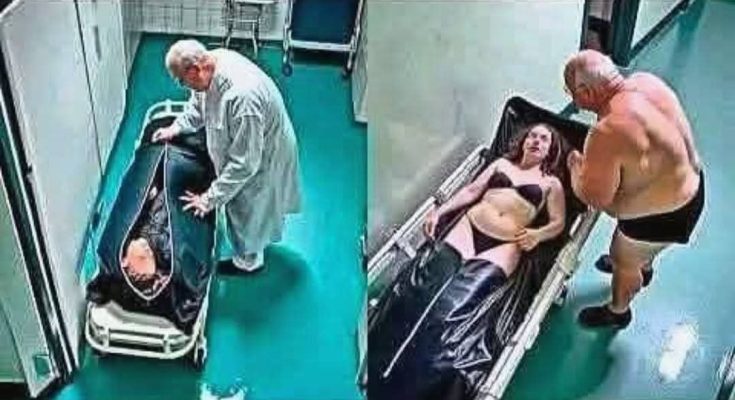The Forensic Doctor Who Took Advantage of the Dead – Without Knowing That He Was Being Watched
Forensic science is often seen as a noble profession dedicated to uncovering the truth behind mysterious deaths. However, sometimes those tasked with delivering justice may themselves be guilty of shocking crimes. One such case is that of a forensic doctor who used his position for sinister purposes—without realizing that his actions would eventually come to light. This case sent shockwaves through the forensic and legal communities, raising ethical concerns that still haunt the industry today.
The Chilling Case of Dr. Vladislav Kocherov
Dr. Vladislav Kocherov was a well-respected forensic pathologist in Russia, known for his meticulous autopsies and vast experience in solving complex murder cases. His work frequently aided criminal investigations, and he was often praised for his expertise. However, beneath his professional facade lay a dark secret that would eventually unravel in the most horrifying way imaginable.
Kocherov had been tampering with the bodies entrusted to him for post-mortem examinations. Instead of performing autopsies with the sole intention of determining the cause of death, he was secretly harvesting organs from cadavers—without the consent of the deceased’s families. For years, he managed to keep his sinister activities hidden, exploiting his access to the morgue and the lack of strict oversight in forensic departments.
A Grieving Family’s Shocking Discovery
Kocherov’s scheme might have continued undetected if not for one grieving family’s persistence. In 2008, a family lost their 35-year-old son in what was initially ruled as an accident. Dissatisfied with the vague explanation given by authorities, they demanded a second autopsy. To their horror, the second medical examination revealed that several vital organs were missing from their son’s body.
Shocked and enraged, the family pressed for an investigation. What they uncovered was beyond their worst nightmares. It turned out that their son was not the only victim—hundreds of other bodies had been similarly tampered with over the years. Kocherov had been removing and selling organs to medical institutions, black-market dealers, and even unethical researchers who were desperate for human tissue samples.
The Investigation Unfolds
The revelation sent shockwaves through the medical community, prompting law enforcement to launch a full-scale investigation into Kocherov’s practices. What they found was deeply disturbing. In addition to the unauthorized organ harvesting, Kocherov had also falsified autopsy reports to cover up his tracks. Many families had been given incomplete or misleading information about the deaths of their loved ones.
Authorities discovered that Kocherov had been part of an underground network trafficking human organs for profit. He had connections to individuals who facilitated the illegal sale of body parts, with some even being used in unapproved medical experiments. The forensic pathologist, who was once seen as a trusted figure in criminal investigations, had become a criminal himself.
How Did He Get Away With It for So Long?
One of the biggest questions surrounding the case was how Kocherov managed to evade detection for so long. The answer lies in the lack of oversight in forensic institutions, the trust placed in medical professionals, and the reluctance of authorities to question official reports.
- Lack of Strict Regulations – At the time, the forensic industry in Russia, like in many other countries, lacked strict oversight when it came to handling cadavers. There were minimal checks on forensic professionals, and no one suspected that a pathologist could be capable of such heinous crimes.
- Blind Trust in Experts – Families rarely questioned autopsy reports, assuming that the findings were accurate. Many did not request second opinions, allowing Kocherov to operate without fear of being exposed.
- Forgery and Manipulation – Kocherov went to great lengths to cover his tracks. He altered reports, fabricated paperwork, and ensured that any missing organs were attributed to natural causes or decomposition.
The Arrest and Trial
As the evidence against him mounted, Kocherov was finally arrested and charged with multiple counts of medical malpractice, illegal organ trafficking, and falsification of forensic reports. His trial was one of the most highly publicized cases in forensic history, drawing international attention due to its gruesome nature.
During the proceedings, Kocherov shockingly admitted that he never thought anyone would notice his actions. He justified his crimes by claiming that the organs were “wasted” otherwise and could have been used for scientific advancement. His defense team argued that some of the organs were donated to medical research institutions, but the prosecution proved that the majority were sold illegally for personal profit.
In 2010, Kocherov was sentenced to life in prison, marking the end of his terrifying reign over the dead. His conviction led to major reforms in forensic pathology regulations, ensuring that stricter oversight was implemented to prevent similar crimes in the future.
The Aftermath and Ethical Concerns
Kocherov’s case left a lasting impact on the medical and forensic communities. It raised serious ethical concerns regarding the handling of human remains and the potential for corruption within forensic institutions.
- Increased Supervision – Following his conviction, several countries, including Russia, introduced stricter policies to monitor forensic pathologists and autopsy procedures.
- Improved Transparency – Families were given more rights to request detailed autopsy reports and second opinions, reducing the chances of such crimes going unnoticed.
- Public Distrust in Forensic Experts – The case damaged the credibility of forensic professionals worldwide, leading to heightened scrutiny in high-profile autopsies and medical examinations.
Could This Happen Again?
While reforms have been made, the case of Dr. Kocherov serves as a chilling reminder that forensic doctors wield immense power over the deceased. The potential for abuse still exists, particularly in countries where forensic oversight remains weak.
The scariest part? Kocherov was caught purely by chance. This raises the terrifying question: how many similar cases have gone undetected? How many families unknowingly buried their loved ones with missing organs? Could there be more forensic doctors exploiting their authority for sinister purposes?
Conclusion
The shocking case of Dr. Vladislav Kocherov remains one of the most disturbing examples of medical misconduct in forensic history. His ability to operate undetected for years exposed severe flaws in forensic oversight, leading to much-needed reforms. However, it also left behind a legacy of distrust and fear.
As forensic science advances, ethical considerations must remain at the forefront to prevent similar cases from happening in the future. Families deserve the truth, and the dead deserve dignity—even in death.
What do you think? Should forensic doctors undergo stricter supervision? Let us know in the comments! 😱



